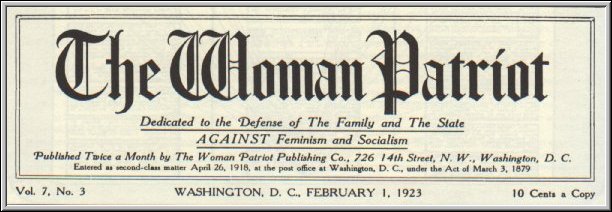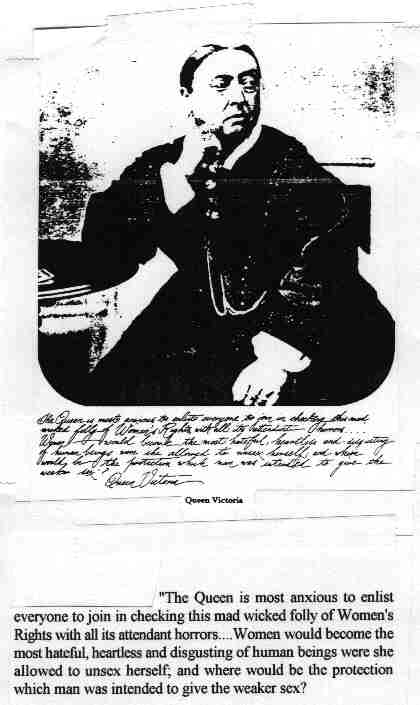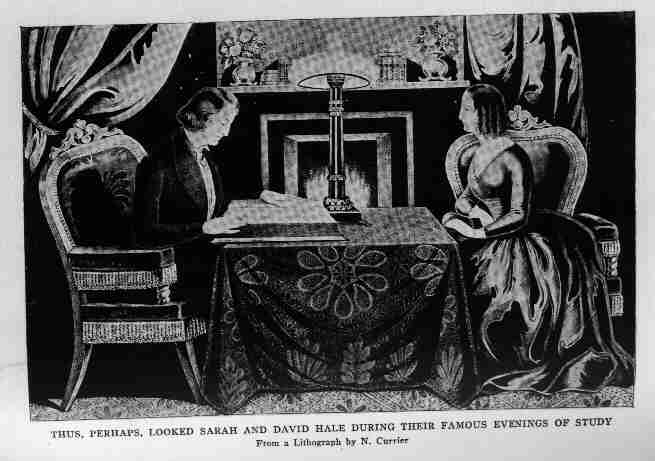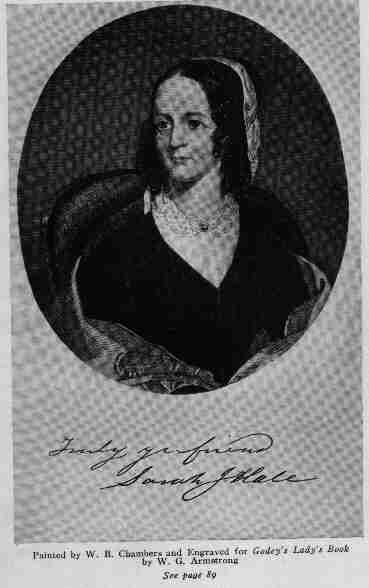
Anti-Suffragists
Shortly before 1920, a group of true women started a magazine called The Woman Patriot. The subtitle said, "Dedicated to the Defense of the Family and the State AGAINST Feminism and Socialism."
This book is dedicated to all those who fight the uphill battle to restore traditional family values and laissez-faire capitalism.

The anti-Suffragists were called Antis. They knew women should not get the vote because it would destroy the family and endanger America, especially the Bolshevists took control of Russia in 1917. They knew that socialism was wrong and that problems must be solved through local organizations. Maybe the vote was inevitable to give women self-esteem. It was the wrong way to do it though. The experiment of Prohibition was called The Noble Experiment. Like Prohibition, women voting, hurt everyone and made matters worse. America declined domestically until now we have an epidemic of AIDS and divorce. Our foreign affairs have been a disaster. We were asleep at Pearl Harbor. We won that war but a few years later as men became weaker, we lost half of Korea and as time past and men became totally feminized, we lost all of Vietnam.

Admiral Fiske was a prominent leader and writer in America. In a speech in 1925 he"upbraided the peacemakers. He said the effeminization of our country was responsible for the unpreparedness with which we entered World War I. He cited Germany, Russia and Japan as strong, virile nations over against England, France and the United States as effeminized. When asked how we could get virile again, he responded, 'Nothing can be done, or if it can I don't know what it is. No man respects and admires women more than I do, but some women have faults and the fault most commonly found is a seemingly insatiable desire to interfere in matters they do not understand. War they understand least and from it they instinctively recoil. There is danger in this situation. Women now have the vote and outnumber the men. There must be some action by the men which will bring women to realize that it is for their comfort and protection that all wars are fought. It is to the interest of women that they permit men to obtain the necessary armament. Only in this way can they be assured of the comfort and protection they need. In spite of themselves we must protect the ladies!"
Men did not teach the ladies. Richard Reeves wrote,"By the middle 1970's, after a history of relatively low interest, women began participating in politics -- talking and voting -- at the same levels as men. And since there were more women -- they live longer -- their political ideas were inevitably going to become more important than men's. They had become the majority in a country where the majority rules. Of course there could only be a majority if it was made up of people who disagreed about something with a minority. What American women and men disagreed about was militarism: they disagreed about going to war."
"Polls, surveys, and political scientists -- and years of plain conversation -- showed that, whatever the situation, women were more opposed to military action than men."

Gloria Steinem in the following quote shows how women were becoming more powerful and less understanding of power. She was young when the Korean War broke out. America had degenerated to the point it approached the war half-heartedly. America was stronger during the Korean War because women were not as influential to be pacifists in politics then. Steinem went along with the war. Later she would be a voice against Vietnam along with countless other women who had weakened America so much it totally lost that war. She said,"Women are more inclined to mistrust violence. We're not trained for it. And it's usually been used against us.... In high school, I remember the guys going off to the Korean War. Some of the girls cried, but there was a feeling it had to be done. Moreover, there was feeling it was the right thing to do. I don't think that's true anymore, for women or for men."
Jeanette Rankin was the first woman to serve in the U.S. Congress and the only member to vote against U.S. entry into both World War I and World War II. Rankin was defeated in 1919 due to her antiwar stand. She was reelected in 1941 but served only one term, again because of her antiwar views. She was the only person in Congress to vote against the United States entering WWII after Pearl Harbor. President John Kennedy said of Miss Rankin"She was a blind isolationist and an impractical pacifist who refused to recognize the harsh realities of world conflict and national security." When she cast her lone vote in not declaring war on Japan the top leaders of both parties went to her on the floor of Congress and tried to explain to her how important it would be if there was a unanimous vote and to have total unity in going to war. She refused.
The Anti-suffragists often wrote of how illogical and dangerous women would be when they got into the public realm. Miss Rankin is one of the most dramatic examples showing that women have no place in government. The following quote is representative of the argument of those wonderful ladies who fought against the feminist campaign for the vote. It is from a magazine that is now out of print. It was written by Ella Winston in 1896. She said in her article"Foibles of the New Woman":"When woman revolts against her normal functions and sphere of action, desiring instead to usurp man's prerogatives, she entails upon herself the inevitable penalty of such irregular conduct, and, while losing the womanliness for which she apparently scorns, fails to attain the manliness for which she strives. But, unmindful of the frowns of her observers, she is unto herself a perpetual delight, calling herself and her kind by the new epithets 'new,' 'awakened.' and 'superior,' and speaking disdainfully of women who differ from her in what, to her judgment, is the all-important question of lifeC'Shall women vote or not?' To enumerate her foibles is a dangerous task, for what she asserts today she will deny tomorrow. She is a stranger to logic, and when consistency was given to mortals the New Woman was conspicuously absent. Her egotism is boundless. She boasts that she has discovered herself, and says it is the greatest discovery of the century." This is a perfect description of feminists like Jeanette Rankin.
Mrs. Winston goes on to say that women had for the"past forty years" been"demanding of man" and"he has graciously granted her" those things."She wanted equality with him, and it has been given to her in all things for which she is fitted and which will not lower the high standard of womanhood that he desires for her. This she accepts without relinquishing any of the chivalrous attentions which man always bestows upon her. The New Woman tells us that 'an ounce of justice is of more value to woman than a ton of chivalry.' But, when she obtains her 'ounce of justice,' she apparently still makes rigorous demands that her 'ton of chivalry" be not omitted." Women cannot expect to compete with men and be treated tenderly as ladies.
She says,"Woman asked to work by man's side on his level; and today she has the chance of so doing. The fields of knowledge and opportunity have been opened to her; and she still 'desires that of which her grandmother did not dream,' because, like an over-indulged child, so long as she is denied one privilege, that privilege she desires above all others. She has decided that without the ballot she can do nothing, for, in her vocabulary, ballot is synonymous with power." A house divided, falls. She goes on to explain how illogical women are. She says,"The New Woman is oftentimes the victim of strange hallucinations. She persists in calling herself a 'slave,' despite her high position and great opportunities." She says people are"weary" of the"constant" complaining of"would-be female politicians" who ignore their"privileges and the silent testimony of countless happy wives." Women she says are not to"make the laws, she trains and educates those who do, and thus is indirectly responsible for all legislation." This is a common theme in antifeminist literature a hundred years ago. Women are to be"indirect" and men"direct." Women are to be educators. The 20th century went to public schools because women got into government and changed the direction men were going. One of the problems in the 19th century was that men put women too high on a pedestal. They gave up too much power to women in educating their children and in church activities. Schools and the churches became feminized. Men gave up spiritual leadership. They incorrectly saw women as purer and more spiritual. They got too caught up in physical work. Hardenbrook gives the history of this sad development in his book, Missing From Action.


